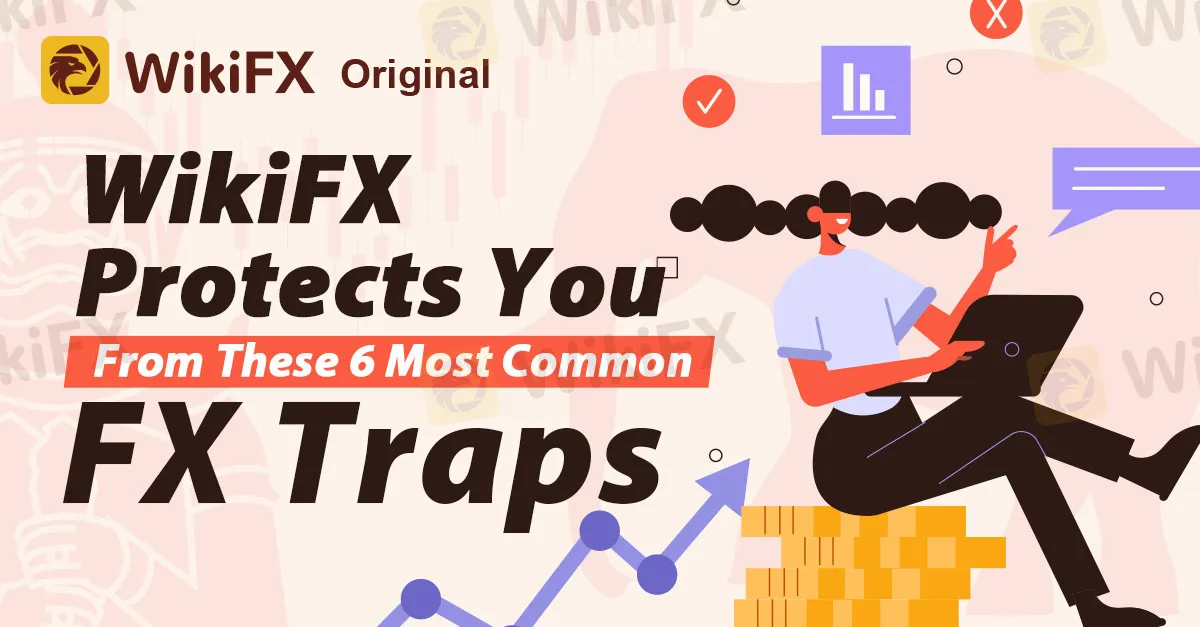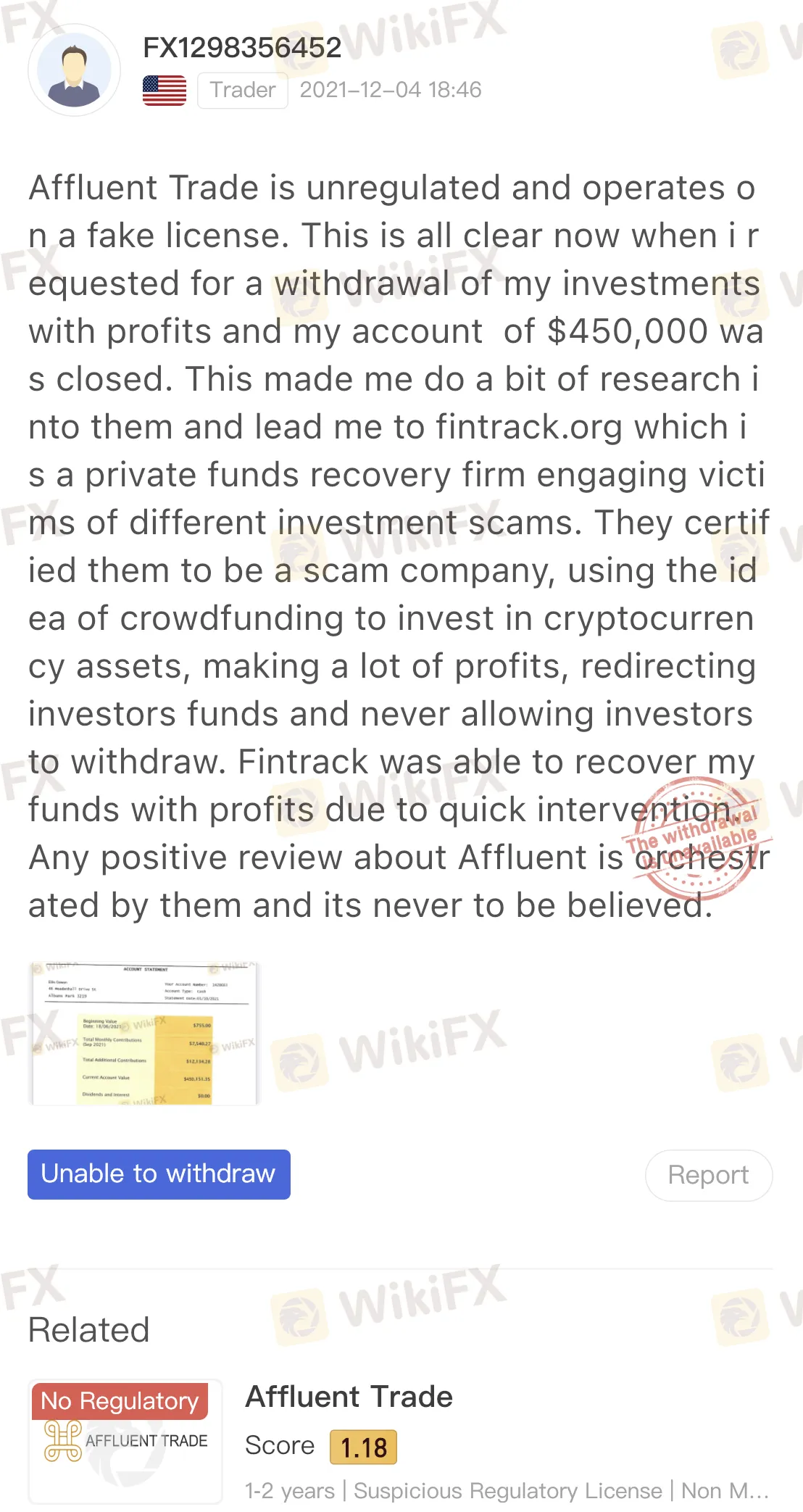简体中文
繁體中文
English
Pусский
日本語
ภาษาไทย
Tiếng Việt
Bahasa Indonesia
Español
हिन्दी
Filippiiniläinen
Français
Deutsch
Português
Türkçe
한국어
العربية
WikiFX Protects You From These 6 Most Common FX Traps
Abstract:The world of forex trading is like the underwater world. It could be full of exciting potentials and fatal risks at the same time. When swimming with the sharks, we retail traders need to pay extra caution to protect ourselves from becoming their prey.

Traders who fell into forex brokers traps may end up losing their money entirely. In this article, WikiFX showcases the 6 most common FX traps that we have gotten genuine complaints from forex traders across the globe through our Exposure page – this is where users can submit their reviews or disputes of their forex brokers respectively for the perusal of others.
1. Fake/unregulated brokerage platforms
Such brokers usually lure traders into deposits, falsely promising high profits or even guaranteed returns, zero spreads, or other unrealistic reward systems. Fraudulent companies tend to show their brands alongside regular platforms as much as possible, and falsely claim their regulatory statutes and licenses to delude users into believing their legitimacy.

2. Copycats
At first glance, these companies are registered with the regulator's website vendor and provide the correct registration number, but further investigation reveals that they are very similar to real regulated brokers and may only be used for a slightly different spelling, logo, or font-variant – just to trick users to entrust them with their trading capital.

To showcase a real-life example directly, we will type in “XM” into WikiFXs search bar. There are several brokers with the name “XM” that come up in the search results.
The image below shows an established and prominent forex broker, named XM.
Its various information has been verified by WikiFX which is the reason behind its high WikiFX score and rating. Moreover, it is under the regulation of several regulatory bodies and holds a few licenses that certify the legitimacy of its business as a whole.

On the contract, the 3 forex brokers attached below are believed to be ‘copycats’ of the original XM broker. This is proven by WikiFX with their low WikiFX score as well as the unavailable regulatory statuses and licenses.



3. Fake linkage to regulatory websites
To gain user confidence, some brokers may fake their licenses and regulatory statuses, or “purchase” a license from an unrecognized organization. However, some brokers that are bold enough may take the extra mile by creating a clone of a regulatory bodys official website and attaching that link to their official broker website while claiming they are not afraid for users to verify them directly. Little do the users know that what they are doing is just vanity because they are basing off fake information.

4. Forex Ponzi scheme or high yield investment schemes (HYIPs)
Financial pyramid schemes, money games, and other Ponzi schemes remain one of the most famous scams within the forex industry. They are often under the disguise of forex followers who enthusiastically promote financial investment programs that promise investors excessive profits. The real truth is that investors money is constantly being transferred, as more people join, there will be more money from those new investors can be used to pay the old investors' fees, so that investors believe that the investment in question can indeed provide high returns, but such scheme seldom withstands the test of time and eventually collapses as the fraudsters escape.

5. Unreliable fund managers and/or analysts
Some brokers assign fund managers or personal analysts to traders who open an account with them. Unfortunately, not all fund managers and analysts will act in favour of their clients. Some of them could be executing orders just to gain commission for themselves at the clients‘ expanses. They might even lose all of their clients’ monies and ask for additional capital again.

Generally, fund managers should have at least a certain degree of professional qualifications, such as a license from the SEC examination and a paid-up capital of their own which serves as an insurance for their customers. Take note if a fund manager is unable to show his license or certification, that is a red flag to be aware of.
6. Bid-ask spread manipulation and stop hunts
Some brokers might take advantage of their trading clients by spontaneously increasing the bid-ask spread. The larger the spread, the more money the broker makes, consequently reducing the profits and/or increasing the losses of their clients.

Lastly, if you have unfortunately found yourself in sticky unresolved disputes with your forex brokers or if you suspect that your broker might be setting up a trap for you and other trading clients, please feel free to contact WikiFX.
You can either upload your concern coupled with as much detailed information/proof as possible on the WikiFXs Exposure page.

Click here for WikiFXs Exposure page (web version): https://exposure.wikifx.com/en/revelation/1.html#issue_roll
If you are a mobile app user, head over to Google Play/App Store to download the free WikiFX app right now and follow the steps below:



Alternatively, contact WikiFX via the channels below:


Disclaimer:
The views in this article only represent the author's personal views, and do not constitute investment advice on this platform. This platform does not guarantee the accuracy, completeness and timeliness of the information in the article, and will not be liable for any loss caused by the use of or reliance on the information in the article.
Read more

HTFX Spreads Joy During Eid Charity Event in Jakarta
On March 14, HTFX showcased its deep commitment to social responsibility by hosting a heartwarming Eid charity event in Jakarta, Indonesia. This meaningful gathering aimed to convey warmth and care through practical actions, uniting the local community and making a significant impact on those in need.

Exposing the Top 5 Scam Brokers of March 2025: A Closer Look by WikiFX
In its latest report for March 2025, WikiFX has released a cautionary ranking of brokers that have raised significant red flags within the trading community. These five platforms, marked by alarmingly low scores, serve as stark reminders of the importance of due diligence when selecting a broker. Below is an in-depth look at each one.

Will natural disasters have an impact on the forex market?
The forex market is known for its rapid responses to global events, but the influence of natural disasters, such as earthquakes and typhoons, can be less straightforward. While headlines may scream about catastrophic damage and economic disruption, the long-term effects on currency values often depend on a blend of immediate shock and underlying economic fundamentals.

Navigating the Intersection of Forex Markets, AI Technology, and Fintech
The financial world is transforming, driven by the rapid integration of artificial intelligence (AI) and innovative fintech solutions. This change is most apparent in forex markets, where algorithmic trading and deep learning are redefining strategies, risk management, and decision-making. In this article, we explore how AI-driven technologies are not only revolutionizing forex trading but are also propelling fintech innovations that enhance customer experiences, bolster security, and unlock new market opportunities.
WikiFX Broker
Latest News
FCA Warns Against 10 Unlicensed or Clone Firms
CySEC Warns Against 14 Unlicensed Investment Websites
Top Currency Pairs to Watch for Profit This Week - March 31, 2025
Will natural disasters have an impact on the forex market?
Philippines Deports 29 Indonesians Linked to Online Scam Syndicate in Manila
Exposing the Top 5 Scam Brokers of March 2025: A Closer Look by WikiFX
Gold Prices Climb Again – Have Investors Seized the Opportunity?
Webull Launches SMSF Investment Platform with Zero Fees
Australian Regulator Warns of Money Laundering and Fraud Risks in Crypto ATMs
AI-Powered Strategies to Improve Profits in Forex Trading
Currency Calculator







